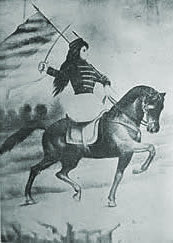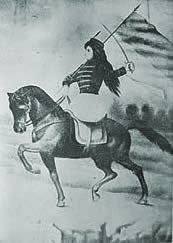
|
Women and Independence in Latin America An exploration of women's involvement in the Latin American Wars of Independence |

|

|
Women and Independence in Latin America An exploration of women's involvement in the Latin American Wars of Independence |

|
Gender:Male
Ethnic origen: White
Events:
| 1808 | - | Montevideo | - | Not applicable | - | He was born in Montevideo in 1808. |
| 1833 | - | Buenos Aires | - | Unknown | - | He moved to Buenos Aires in 1833. |
| 1837-1838 | - | Buenos Aires | - | Unknown | - | He co-founded the Salón del ´37, that lasted from June 1837-January 1838. |
Connections:
Argentine exiles in UruguayBiography:
Born in Montevideo in 1808, he worked to obtain popular education in Montevideo that included the tuition of women. He founded schools, authored instruction programmes and texts; he supervised school construction and student fields and farms. (Katra, p.311, note 74.)
He was a religious man dedicated to the classics. Political instability in Uruguay led to his move to Buenos Aires in 1833. He bought a bookshop in Buenos Aires, enlarged it and held meetings there inviting readers to form Marcos Sastre’s Salón Literario, at which Argentine young intellectuals from the University discussed ideas. By 1836 Sastre was the main supplier of books in Buenos Aires and promoted works “of good taste”. He praised Rosas for restoring peace and order to Argentina. (Katra, 47-49)
In 1837, Sastre, Alberdi and Juan María Gutiérrez founded the Salón del ’37, a Buenos Aires based salón literario. This was also known as Marcos Sastre’s Salón Literario. It was composed of a group of young intellectuals who were dissatisfied with Rosas’s infiltration/ control of the University. They met in Sastre's library to design a project of national conscience and liberal reforms to bring about Rosas’s downfall. It had about 50 members, among them Vicente López, and Esteban Echeverría. They also devised the cultural programme implemented by Sarmiento. (Denegri, 120.) It lasted only for a few months due to Sastre’s approval of Rosas for having brought order and peace to Argentina. (Katra, 48.)
His Buenos Aires salón ran from June 1837-January 1838. (Garrels, 28)
References:
Denegri, Francesca (1996) El Abanico y la Cigarerra: La primera generación de mujeres ilustradas en el Perú, 1860-1895
Garrels, Elizabeth (1989) "La nueva Eloisa en América o el ideal de la mujer de la generación de 1837"
Katre, William H. (1996) The Argentine Generation of 37, Echeverría, Alberdi, Sarmiento, Mitre
Sáenz Quesada, María (1996) Mariquita Sánchez, Vida política y sentimental